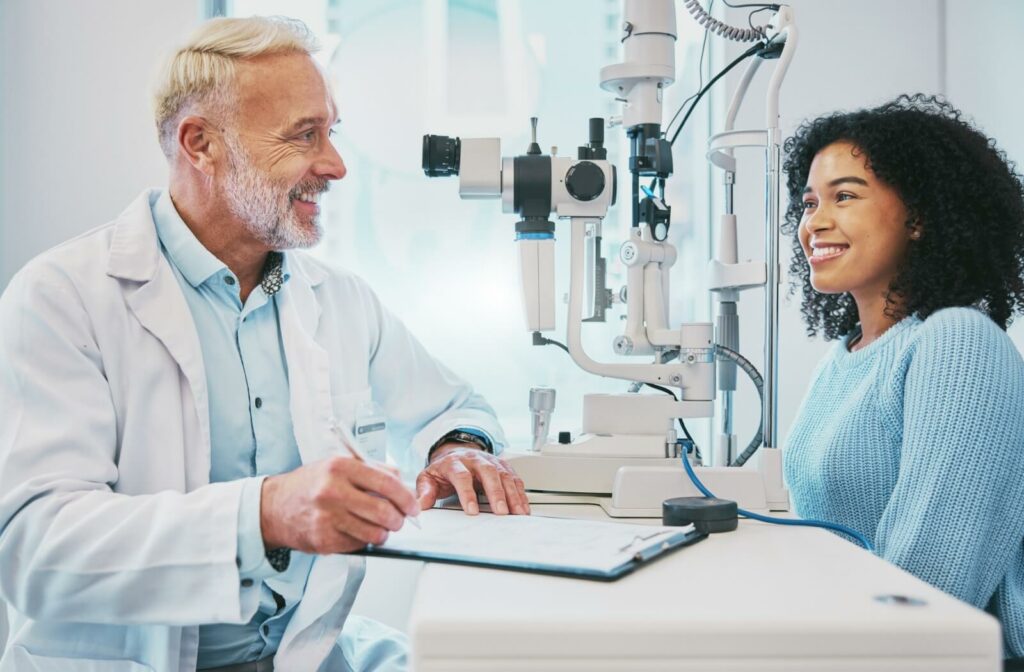All Categories
Featured
Table of Contents
Eye wellness is a critical part of general wellness, and routine eye exams play an important role in preserving great vision throughout life. Each age team has details demands and risks connected to eye health, making it important to follow tailored suggestions for eye exams. Here's a detailed overview of just how frequently eye examinations ought to be scheduled for different age.
After the first examination, children need to have a second eye exam around age 3, when they can much better join testing and assessment. If no vision troubles are recognized, the next examination is suggested before beginning college, normally around age five. Early detection of problems can bring about prompt intervention and support healthy and balanced aesthetic advancement.
Moms and dads need to look for indicators of vision issues, such as problem reading the chalkboard, scrunching up your eyes, or experiencing migraines. It's essential to schedule an eye exam without delay if any of these symptoms emerge. Youngsters who join sporting activities might take advantage of yearly eye examinations to make certain optimal aesthetic efficiency and security during activities.
![]()
Young people frequently experience electronic eye pressure because of substantial screen time, resulting in signs and symptoms like dry skin and pain. Looking for an eye exam is important if you notice these symptoms. An eye treatment professional can offer solutions, such as computer system glasses or way of living changes, to minimize strain.
For individuals with wellness conditions like diabetes mellitus or hypertension, even more constant tests may be required. Regular monitoring is necessary for early detection and management of possible issues that can influence vision.
Elders may also experience adjustments in their visual understanding, such as trouble seeing in low light or identifying shades. Regular eye examinations permit for prompt intervention and aid keep freedom and lifestyle.
Babies (0-2 Years)
Infants undergo substantial aesthetic advancement in their early years, making early eye exams vital. The American Academy of Pediatric medicine advises that babies have their very first eye exam at concerning six months old. This initial visit helps identify any type of potential vision troubles, such as strabismus (crossed eyes) or hereditary cataracts, which can impact advancement otherwise attended to early.After the first examination, children need to have a second eye exam around age 3, when they can much better join testing and assessment. If no vision troubles are recognized, the next examination is suggested before beginning college, normally around age five. Early detection of problems can bring about prompt intervention and support healthy and balanced aesthetic advancement.
Kids (3-18 Years)
For school-aged children, regular eye examinations are essential for both scholastic success and general wellness. Youngsters must have their eyes checked every one to 2 years, depending on their individual requirements. Colleges usually carry out vision screenings, yet these do not change extensive eye tests by an eye treatment professional.Moms and dads need to look for indicators of vision issues, such as problem reading the chalkboard, scrunching up your eyes, or experiencing migraines. It's essential to schedule an eye exam without delay if any of these symptoms emerge. Youngsters who join sporting activities might take advantage of yearly eye examinations to make certain optimal aesthetic efficiency and security during activities.
Young Person (19-39 Years)
During young their adult years, many individuals enjoy relatively steady vision, however that does not mean eye treatment can be overlooked. Young adults must arrange thorough eye tests every two years. Those that put on call lenses or have a family background of eye disease need to think about yearly examinations.
Young people frequently experience electronic eye pressure because of substantial screen time, resulting in signs and symptoms like dry skin and pain. Looking for an eye exam is important if you notice these symptoms. An eye treatment professional can offer solutions, such as computer system glasses or way of living changes, to minimize strain.
Adults (40-64 Years)
As individuals enter their 40s, changes in vision can come to be more noticeable, particularly presbyopia, a problem that makes it challenging to focus on close items. Grownups in this age need to schedule eye exams every one to 2 years. This is also the age when many eye diseases, such as glaucoma and diabetic person retinopathy, can begin to develop.For individuals with wellness conditions like diabetes mellitus or hypertension, even more constant tests may be required. Regular monitoring is necessary for early detection and management of possible issues that can influence vision.
Seniors (65 Years and Older)
Elders go to a raised risk for numerous eye diseases, including cataracts, age-related macular degeneration, and glaucoma. It's advised that people aged 65 and older have an eye test at the very least annually. Early discovery of these conditions is important, as several can be dealt with efficiently if captured early.Elders may also experience adjustments in their visual understanding, such as trouble seeing in low light or identifying shades. Regular eye examinations permit for prompt intervention and aid keep freedom and lifestyle.
Verdict.
Focusing on eye care and normal exams ensures that individuals can delight in clear vision and a better high quality of life, making eye wellness an important aspect of long-lasting wellness. Normal examinations with an eye treatment expert will pave the means for healthier eyes and a brighter future.Table of Contents
Latest Posts
Experience Coastal Sophistication at Deauville Inn
Published en
1 min read
Host Your Perfect Event: Location Rental Choices for Every Event
Published en
1 min read
The Boogaloo Sports Bar & Grill at FunCity Resort Resort: Where Enjoyable Meets Flavor
Published en
1 min read
More
Latest Posts
Experience Coastal Sophistication at Deauville Inn
Published Apr 10, 25
1 min read
Host Your Perfect Event: Location Rental Choices for Every Event
Published Mar 28, 25
1 min read
The Boogaloo Sports Bar & Grill at FunCity Resort Resort: Where Enjoyable Meets Flavor
Published Feb 05, 25
1 min read